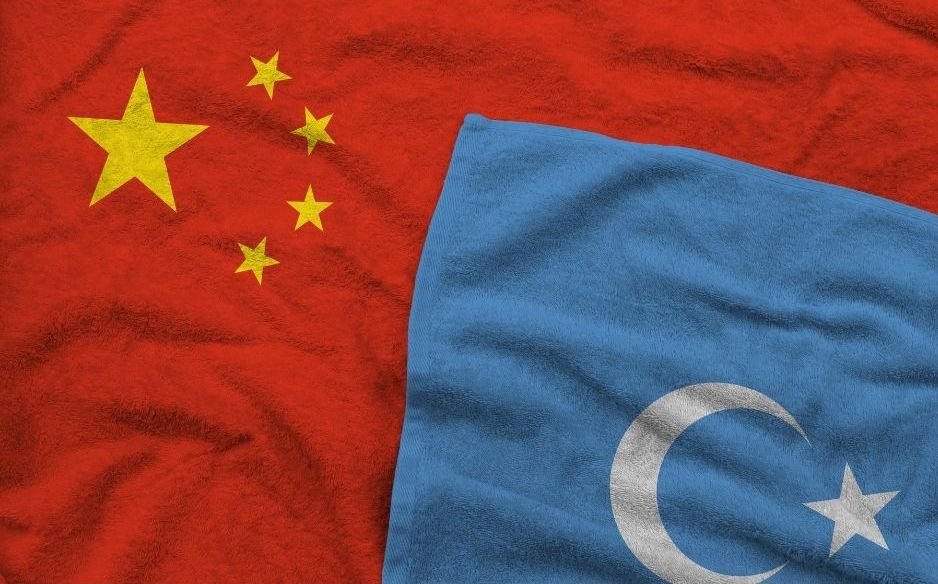Image of detained Uyghurs from leaked Xinjiang Police Files from ABC.net.au
Sign the petition to let the Federal Government that you support the banning of goods made with forced labour.
Built on Repression
The industry calls it “luxury vinyl tile.” In reality, the popular plastic flooring is produced using toxic chemicals — and forced labor. A new report, by Dr Laura Murphy, Nyrola Elimä & Jim Vallette at Sheffield Hallam University’s Helena Kennedy Centre for International Justice in England and at the Maine-based toxic chemical investigative outfit Material Research, details the toll taken by the flooring industry, painting a devastating picture of oppression and pollution in the Uyghur region, all to help consumers cheaply renovate their homes.
Uyghur Forced Labour
The horrendous treatment of Uyghur and other minority groups in China has been an issue closely followed by Be Slavery Free since we first learned of forced organ harvesting years ago.
In May 2022, there was a large document leak of Xinjiang Police files which included almost 3,000 photos of Uyghurs who were detained in 2019. There were heartbreaking stories of Uyghurs spending hours trawling through photos, hoping to see photos of their missing loved ones (or perhaps they were dreading seeing photos of their loved ones?). The data leak also outlined a "shoot to kill" policy if any Uyghurs tried to escape detention.
The time for Australia to act is NOW.
We understand that the following are occurring in China:
More than a million Uyghurs and Turkic Muslim minorities are in ‘re-education camps’ as well as being forced into ‘vocational training’ work in factories and on farms in Xinjiang Province and being moved to other Chinese provinces.
Their labour takes place in the context of extensive and intrusive surveillance and at times in the context of internment or imprisonment. They are not free to leave.
Failure to comply with the programs results in penalties, including loss of personal freedom and other sanctions, including against family members.
These factories supply global brands in industries ranging from garments and electronics to home decorations. These brands profit from this forced labour and provide their goods to consumers, including in Australia.
Photo from End Uyghur Forced Labour.
How does it affect me?
-
China is the third largest cotton producing country in the world, and Xinjiang Province provides the 84% of that cotton (20% of world’s cotton).
This means that any clothing with cotton has a high risk of being tainted with forced labour of Uyghurs.
Read the landmark report Laundering Cotton by Sheffield Hallam University.
Find out more on our Cotton page.
-
Australia is leading the world in rooftop solar. But we can’t let our desire for green energy come at the expense of human rights. Xinjiang produces 45% world’s polysilicone (a key component in solar panels). Read landmark report - In Broad Daylight: Uyghur Forced Labour and Global Solar Supply Chains.
-
18% of tomatoes and 40% of tomato paste comes from Xinjiang. Sometimes tomatoes and tomato products tainted with forced labour are processed in an intermediary country, then exported to final destination countries. Read about how Canada’s supermarkets are stocked with tomato products from Xinjiang.
As of October 2021 there were 263 measures – 210 in force, 45 proposed, 8 expired sanctions or other measure against forced labour in Xinjiang region by governments.
The world’s response to addressing forced labour is growing - and growing quickly. Not only is there concern and steps taken against goods produced with Uyghur forced labour (and other Turkic groups) in Xinjiang Uyghur Autonomous Region (XUAR).
The United States’ Uyghur Forced Labor Prevention Act (UFLPA) took effect on June 21 and requires US importers to provide “clear and convincing evidence” that goods made whole or in part in the Xinjiang Uyghur Autonomous Region of China (XUAR) were not produced using forced labor.
Two high-priority sectors identified by the US have been cotton and cotton products, and silica-based products (including polysilicon). US importers are seeing these products detained under UFLPA.
Global Action
Australia falls far behind other leading countries in its action against forced labour and it leaves Australian businesses without the protection of Government advisories or legislation. There is real danger and consequences for businesses that take public action or make statements about treatment of Uyghurs in Xinjiang (remember H&M and Nike?). Australian businesses doing the right thing should not be placed at a competitive disadvantage to those who are knowingly or unknowingly using forced labour in producing products while we wait for the Australian Government to get their act together. Australian Government has a duty to stand up against human rights abuses and protect Australian businesses to do the same. Read more
Australia’s Inaction

What can you do?
-
The Bill was first proposed by independent Senator Rex Patrick after chilling testimony of mass internment and forced labour by Uyghurs and other Turkic Muslims was heard by the Senate Standing Committee on Foreign Affairs, Defence and Trade earlier this year. It was passed by the Senate in August. Similar legislation has been enacted in the US and Canada.
The Human Rights Law Centre, the Australian Council of Trade Unions, the Australian Uyghur Tangritagh Womens’ Association and Be Slavery Free have all backed the ban.
They are also calling on the Federal Government to implement all recommendations made by the Senate Committee to ensure the legislation can be robustly enforced, including additional investigative powers and resourcing for Australian Border Force and a rebuttable presumption that goods will be detained where evidence reasonably indicates the use of forced labour.
Sign the petition at the top of this page.
-
In April 2022, Australia ratified the International Labour Organization’s Protocol 29 on Forced Labour.
This ratification is significant because it is a binding protocol and it updates Australia’s obligations to fight against forced labour – prevention, protection for victims and criminal justice.
Support strong legislation and regulation that upholds our obligation under the P29.



